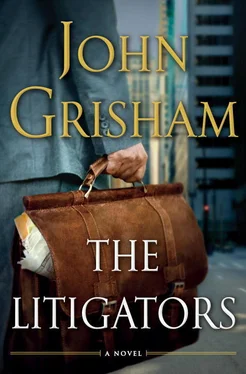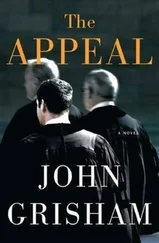At that stage of their involvement, Wally would have promised her anything.
“Where to, dear?” she said, racing away from the office. She was a dangerous driver in a little Mazda convertible, and Wally knew his chances would be slim in a collision. “Just take it easy,” he said, ratcheting down the seat belt. “Let’s go north, toward Evanston.”
“Are we hearing from these people?” she asked.
“Oh yes. Lots of phone calls.” And Wally wasn’t lying — his cell phone rang constantly with inquiries from people who had picked up his little “Beware of Krayoxx!” brochure. He had printed ten thousand and was littering Chicago with them. He tacked them on bulletin boards in Weight Watchers meeting rooms, VFW posts, bingo parlors, hospital waiting rooms, and the restrooms of fast-food restaurants — anywhere the shrewd mind of Wally Figg thought there might be people battling high cholesterol.
“So how many cases do we have?” she asked.
Wally did not miss the “we” part of her question. He wasn’t about to tell her the truth. “Eight death cases, several hundred non-death, but they have to be tested first. I’m not sure every non-death case is really a case. Gotta find some damage to the heart before we take on the case.”
“How do you do that?” They were flying along the Stevenson, dodging traffic, most of which she didn’t appear to notice. Wally was ducking with each near miss. “Take it easy, DeeAnna, we’re not in a hurry,” he said.
“You’re always bitching about my driving,” she said as she gave him a long, sad look.
“Just watch the road. And slow down.”
She eased off the gas and pouted for a few minutes. “As we were saying, how do you know if these people have been damaged?”
“We’ll hire a doctor to screen them. Krayoxx weakens the heart valves, and there are some tests that can tell us if a client has been harmed by the drug.”
“How much are the tests?” she asked. Wally was noticing a growing curiosity into the economics of their Krayoxx litigation, and it was slightly irksome.
“About a thousand bucks a pop,” he said, though he had no idea. Jerry Alisandros had assured him that Zell & Potter had already retained the services of several doctors who were screening potential clients. These doctors would be made available to Finley & Figg in the near future, and once the testing began, their pool of non-death clients would expand greatly. Alisandros was on a jet every day zipping across the country, meeting with lawyers like Wally, piecing together big lawsuits here and there, hiring experts, plotting trial strategies, and, most important, hammering away at Varrick and its lawyers. Wally felt honored to be a player in such a high-stakes game.
“That’s a lot of money,” DeeAnna said.
“Why are you so concerned about the money?” Wally snapped, glancing down at her unbuttoned cowgirl shirt.
“I’m sorry, Wally. You know I’m the nosy type. This is all so exciting and stuff, and, well, it’ll be so awesome when Varrick starts writing those big checks.”
“That could be a long way off. Let’s just concentrate on rounding up the clients.”
At the Finley home, Oscar and his wife, Paula, were watching a M*A*S*H rerun on cable when they were suddenly confronted with the shrill voice and anxious face of a lawyer named Bosch, who was no stranger to cable commercials in the Chicago market. For years, Bosch had been pleading for car wrecks and tractor-trailer accident victims and cases involving asbestos and other products, and now, evidently, Bosch had become an expert on Krayoxx. He thundered on about the dangers of the drug and said vile things about Varrick Labs, and throughout the entire thirty seconds his phone number was pulsating across the bottom of the screen.
Oscar watched with great curiosity but said nothing.
Paula said, “Have you ever thought about advertising on television, Oscar? Seems like your firm needs to do something to get more business.”
This was not a new conversation. For thirty years, Paula had dispensed unsolicited advice on how to run the law office, a place that would never generate enough in revenue to satisfy her.
“It’s very expensive,” Oscar said. “Figg wants to pursue it. I’m skeptical.”
“Well, you certainly couldn’t put Figg on television, could you? That would scare away every potential client for a hundred miles. I don’t know, the ads just seem so unprofessional.”
Typical of Paula. TV advertising might bring in some business, and at the same time it was unprofessional. Was she for it or against it? Neither, or both? Oscar didn’t know, and he’d stopped caring years earlier.
“Doesn’t Figg have some Krayoxx cases?” she asked.
“A few, yes,” Oscar grunted. She did not know that Oscar, as well as David, had signed the lawsuit and was responsible for its prosecution. She did not know that the firm was on the line for litigation expenses. Paula’s only concern was the paltry monthly draw brought home by Oscar.
“Well, I discussed it with my doctor, and he says the drug is fine. It keeps my cholesterol under two hundred. I am not getting off the drug.”
“Then you should not,” he said. If Krayoxx did in fact kill people, he wanted her to keep taking the full daily dosage.
“But there are lawsuits everywhere, Oscar. I’m still not convinced. Are you?”
She’s loyal to the drug, but she’s worried about the drug.
“Figg is convinced the drug causes damages,” Oscar said. “A lot of big law firms agree, and they’re going after Varrick. The general feeling is that the company will settle before going to trial. Too much at risk.”
“So, if there’s a settlement, what happens to Figg’s cases?”
“They’re all death cases, so far. Eight of them. If they settle, then we’ll collect some nice fees.”
“How nice?”
“It’s impossible to say.” Oscar was already making plans. If and when the settlement talk became serious, he would move out, file for divorce, then try to keep her away from his Krayoxx money.
“But I doubt they’ll settle,” he said.
“Why not? Bosch here says there might be a big settlement.”
“Bosch is an idiot, and he proves it every day. These big pharmaceuticals usually go to trial a few times to test the waters. If they get hammered by juries, then they start settling. If they win, they keep trying the cases until the plaintiffs’ lawyers give up. This could take years.”
Don’t get your hopes up, dear.
David and Helen Zinc had been almost as amorous as Wally and DeeAnna. With David working shorter hours and their newfound energy, it had taken less than a week to become pregnant. Now that David was home at a decent hour every night, they made up for lost time. They had just finished a session and were lying in bed watching late-night TV when Bosch appeared on their screen.
When he was gone, Helen said, “Looks like a frenzy.”
“Oh yes. Wally’s out there somewhere right now, littering the streets with brochures. It would be easier to advertise on television, but we can’t afford it.”
“Thank God for that. I really don’t want to see you on-screen fighting it out with the likes of Benny Bosch.”
“I think I’d be a natural as a TV lawyer. ‘Have you been injured?’ ‘We fight for you.’ ‘Insurance companies fear us.’ Whatta you think?”
“I think your friends at Rogan Rothberg would howl with laughter.”
“I have no friends there. Only bad memories.”
“You’ve been gone, what, a month?”
“Six weeks and two days, and I have not, for one moment, wanted to go back.”
“And how much have you earned with your new firm?”
“Six hundred and twenty dollars, and counting.”
Читать дальше












